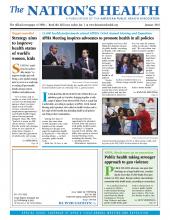The Supreme Court is taking on a case that could put the brakes on college admission processes that take race and ethnicity into account — and impact the future of the public health workforce.
On Dec. 9, the U.S. Supreme Court will review Fisher v. University of Texas at Austin, an affirmative action case that has alternated between the high court and the U.S. Court of Appeals for the Fifth Circuit since 2012. The case will examine the use of race and ethnicity in college admission decisions.
Ruling against the use of race and ethnicity as factors in the admissions process would have a negative impact on medical school admissions and the U.S. health workforce, according to a November friend-of-the court brief from APHA and other advocates.
The brief, which was submitted by the Association of American Medical Colleges, said that a negative ruling will inhibit medical schools from considering a student’s background, which would have an adverse impact on both classrooms and patients. Medical and other health professional schools consider applicants’ backgrounds to contribute to a culturally diverse and competent workforce. According to the brief, physicians and health professionals are better prepared to serve a range of patients if they have personal experience and a diverse learning environment.
“Given the persistence of health disparities among minority communities and the unconscious bias that contributed to that problem, amici strongly believe that it remains necessary in 2015 for institutions to continue to take action to ensure diversity in the admissions process,” the brief stated.
If the Supreme Court rules against the university, equal educational opportunities may not be ensured for students of color. According to the Leadership Conference on Civil and Human Rights, admissions-based affirmative action breaks down barriers to fairly represent minorities in educational institutions.
The court case centers on Abigail Fisher, a white woman, who was rejected for admission to the University of Texas at Austin’s entering class in 2008. Fisher sued the University of Texas, alleging that the school’s use of race during her selection process violated the Equal Protection Clause of the 14th Amendment of the U.S. Constitution. According to Cornell University Law School, the Equal Protection Clause states that the law must treat an individual in the same manner as another individual under similar conditions. The U.S. Court of Appeals agreed with the university; however, the high court disagreed with the appeals court decision and wanted “strict scrutiny,” the judicial review that the U.S. court system uses, when validating the school’s decision on Fisher’s rejection.
According to the University of Texas at Austin, the school’s admissions process guarantees admission to students in the top 10 percent of their high school class. The university also conducts “holistic reviews” of each candidate by assessing their personal and academic accomplishments and capabilities. The university considers applicants from predominantly black or Hispanic backgrounds or areas while conducting the reviews to encourage campus diversity.
Such admission policies allow colleges and universities to help underrepresented students aim for higher education. Affirmative action admission programs have helped triple the amount of minorities that apply to colleges or universities, according to the National Conference of State Legislatures. The organization states that graduates who benefited from affirmative action admission policies have reported receiving better opportunities, such as jobs, income and quality of life.
Andrew Grossman, JD, MGA, MPA, a constitutional law and litigation expert at BakerHostetler, a Washington, D.C., law firm, spoke at the National Press Club on Oct. 27 on the case. He said he thinks Fisher will prevail against the University of Texas.
“It is of great importance to Americans when government makes decisions on race,” Grossman told The Nation’s Health. “However, it is illegal in some states for schools to use affirmative action today, because it violates the 14th Amendment.”
To have leverage in the case, Grossman suggested the university needs to sufficiently explain precisely what factors are taken into account during the admissions process. Each applicant is reviewed by one evaluator without second opinions, therefore, it is “difficult to conclude what the admission reviewers are doing,” said Grossman.
“From a legal matter, universities should be held to the 14th Amendment,” Grossman said. “Universities can base their preferences on socioeconomic status or they can (do) outreach to communities who are underrepresented on campus to achieve diversity. Universities can add diversity to campuses without considering racial make-up.”
The APHA friend-of-the-court brief disagrees, however, noting that “there is no proven substitute for this individualized, holistic review that may consider an applicant’s race and ethnicity along with all other factors that make up his or her background.” The brief is the second that APHA has been part of since the case began, with the Association also weighing in in 2012.
“Medical schools strongly believe that diversity in the educational environment is integral to instilling in new physicians the cultural competence necessary to more effectively serve a diverse society,” the new brief stated. “They are committed to creating a diverse educational environment because they believe that a diverse student body produces educational outcomes that ultimately benefit public health.”
To read the APHA brief, visit www.apha.org/∼/media/files/pdf/advocacy/briefs/151103_ut_fisher_health_amicus.ashx.
- Copyright The Nation’s Health, American Public Health Association









